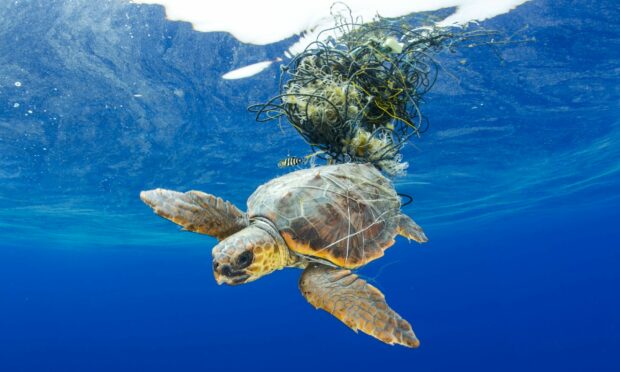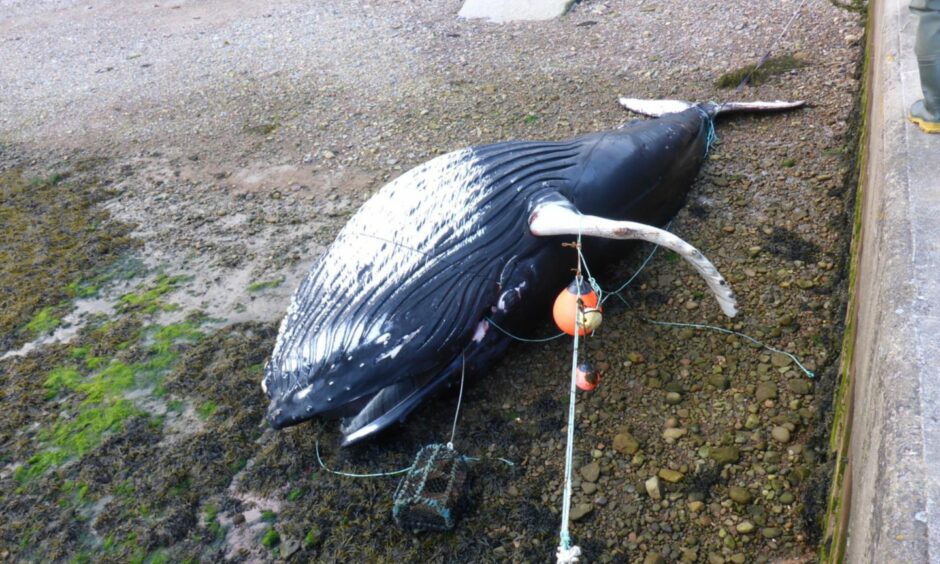A Scottish trawlerman whistleblower has claimed French and Spanish fishing boats are discarding fishing gear in the sea, causing birds and marine life to become entangled and killed.
According to environmental campaign group Greenpeace, lost and abandoned nets and other fishing gear are by far the biggest source of plastic pollution in the world’s oceans.
It is estimated more than 640,000 tonnes of nets, lines, pots and traps used in commercial fishing are dumped and discarded in the sea every year – the same weight as 55,000 double-decker buses.
Scottish Government stumps up nearly £180k for Fishing for Litter
Governments unite to deliver UK-wide fishing policy
Animals such as fish, whales, turtles and seabirds can become entangled in the “ghost gear” and may either drown within minutes or suffer long, slow deaths lasting months or even years with debilitating wounds, infection and starvation.
This equipment is often made of long-lasting plastics so can continue to harm the marine environment for hundreds of years.
“Ghost fishing” is a term used when abandoned, lost and discarded fishing gear continues to catch marine life.
Aberdeenshire East SNP MSP Gillian Martin has raised the issue at Holyrood after the whistleblower reported foreign-registered fishing vessels dumping gill nets – a wall of netting that hangs in the water – and other gear into the sea.
Ms Martin has campaigned before to highlight the impact marine litter has on sea life.
She is now seeking further clarification on the scale of such activity in Scottish waters.
The MSP also wants to know exactly what is being done to catch and penalise the culprits.
In a letter to Rural Affairs and Islands cabinet secretary Mairi Gougeon, Ms Martin said: “As I know you will be aware, there has been concern about this practice before, and it is something I have been aware of anecdotally from people in my constituency.
‘Deliberately’ discarded
“I know the Scottish Government have prohibited the use of gill nets within six miles of our coastline, but beyond this range it would appear they are being deliberately discarded by some vessels.
“There is concern vessels are discarding waste in the ocean, rather than retaining it onboard to discard when they are back onshore.
“I want to know what evidence there is for this, and what monitoring there is on the scale and origin of the pollution.”
Commenting, Ms Martin said: “We must protect sea birds and marine life from completely avoidable deaths at the hands of abandoned fishing gear.
“It is contributing to the destruction of life in waters around Scotland, leaving birds, seals and cetaceans trapped and dying in nets, gill nets and longlines (a commercial fishing technique in which numerous baited hooks are trailed from a line that can be miles long).”
We must protect sea birds and marine life from completely avoidable deaths at the hands of abandoned fishing gear.”
Gillian Martin MSP.
She added: “As a representative of a coastal community, I regularly do beach cleans and the amount of waste that is on the sand alone is astonishing.
“It is very apparent to me that fishing gear is a large percentage of the litter I collect.
“We cannot allow vessels to be discarding their own waste in to the water, rather than using the storage space they have, to bring it back onshore.”
Ms Martin said she was keen to find out what data the Scottish Government currently has on gear dumps and also “what avenues may be open to discourage further practice”.
Any form of dumping and other illegal activities is completely unacceptable.
Scottish Government spokesman.
Regulations covering the disposal of litter and fishing gear at sea are enforced by the Maritime and Coastguard Agency (MCA).
A Scottish Government spokesman said: “We take protection of the marine environment seriously and are clear that any form of dumping and other illegal activities is completely unacceptable.
“Marine Scotland officers often proactively report incidents through our intelligence system to the MCA and we periodically remind vessels of their obligations under Marpol (the International Convention for the Prevention of Pollution from Ships Regulations).
“We would encourage anyone with intelligence relating to suspicious activities by vessels to report this to us on our website.” The online form for this is at www.marine.scotland.gov.uk/mscomplainceForms/


